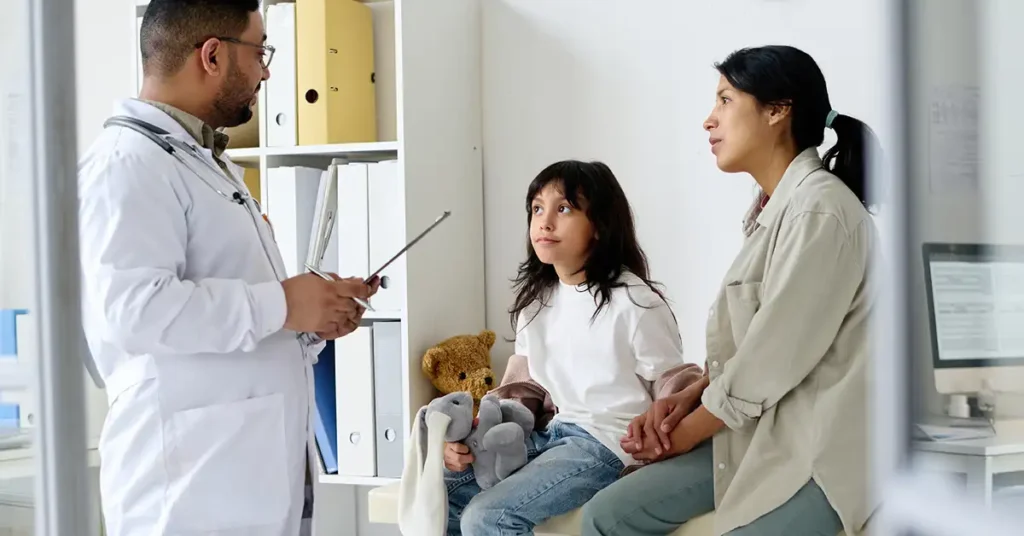When families pursue immigration to the United States with children, vaccination requirements can create unexpected legal complexities that demand immediate attention. The intersection of pediatric healthcare, immigration law, and federal policy creates a challenging landscape where even minor procedural errors can result in significant delays or denials that affect entire families’ immigration prospects.
Unlike adult cases where vaccination requirements follow standard protocols, child vaccine exemption immigration cases involve nuanced considerations around age appropriate vaccine schedules, medical contraindications specific to pediatric patients, and the unique legal standing of minors in immigration proceedings. Federal authorities maintain strict oversight of these cases, requiring families to navigate complex documentation requirements while meeting tight deadlines that can determine their future in the United States.

Child Vaccine Exemptions for Immigration
Child vaccine exemptions for immigration purposes represent formal waivers that allow children to proceed with their immigration applications despite not meeting standard vaccination requirements. These exemptions acknowledge that certain circumstances—whether medical or religious—may prevent children from receiving all required vaccines before their immigration medical examination. Vaccine waivers are exclusively available to individuals applying for lawful permanent residency, ensuring that these exemptions are applied within a specific legal framework.
The vaccination requirement for immigration purposes stems from the Immigration and Nationality Act, which mandates that all applicants for immigrant visas and adjustment of status demonstrate protection against vaccine preventable diseases. For children, this requirement intersects with CDC guidelines that specify age appropriate vaccine schedules, creating situations where some vaccines may not be medically indicated for younger applicants. All applicants for lawful permanent residency must submit to a medical examination that includes vaccination requirements, ensuring compliance with these federal standards.
During the immigration medical examination, panel physicians and civil surgeons must evaluate each child’s vaccination history against current requirements. The vaccination assessment considers not only which vaccines the child has received, but also which vaccines are appropriate for their age according to established immunization practices. This evaluation can reveal gaps that require either immediate vaccination or formal exemption requests. Additionally, the Civil Surgeon annotates the required vaccination status on Form I-693, which is a critical part of the immigration process.
The process involves coordination between multiple federal agencies, including the Department of Health and Human Services, immigration services, and disease control authorities. Each agency maintains specific protocols for evaluating exemption requests, creating a complex regulatory framework that families must navigate successfully to achieve their immigration goals.
When Can Children Receive Vaccine Waivers for Immigration?
Children may qualify for vaccine waivers under several distinct circumstances, each requiring different documentation and legal strategies. The most common situations involve medical contraindications, religious or moral objections, and age-related considerations that affect vaccine appropriateness.
Medical exemptions represent the most straightforward path for children who cannot safely receive certain vaccinations. These cases require documentation from qualified medical professionals demonstrating that specific vaccines pose genuine health risks to the child. Common medical grounds include severe allergic reaction histories, immunocompromised conditions, or chronic illnesses that contraindicate particular vaccines.

Are Vaccine Medical Exemptions Different for Children?
Medical exemptions for children involve unique considerations that distinguish them from adult cases. Civil surgeons and panel physicians must evaluate whether vaccines are medically appropriate for pediatric patients based on current medical standards and individual health circumstances.
The medical examination conducted for immigration purposes requires thorough review of the applicant’s vaccine history and current health status. For children, this examination must consider developmental factors, existing medical conditions, and contraindications specific to pediatric populations. Panel physician overseas locations may have different protocols, but all must follow established vaccination technical instructions.
The civil surgeon’s evaluation must demonstrate that the specific vaccine poses genuine medical risks that outweigh the benefits. This assessment requires detailed medical documentation and often consultation with pediatric specialists.
Age appropriate vaccine schedules create automatic exemptions for certain vaccines that are not yet indicated for younger children. For example, the zoster vaccine is not recommended for pediatric patients, creating an automatic exemption for children regardless of their immigration status. These age-based exemptions require no additional waiver applications but must be properly documented in the medical examination report.
How Do Religious and Moral Conviction Vaccine Exemptions Apply to Children?
Religious and moral conviction exemptions for children involve complex legal considerations around parental authority and the sincerity of family beliefs. Parents or guardians claiming exemptions based on religious beliefs or moral convictions must demonstrate that these beliefs accurately reflect genuine convictions that oppose all the vaccines, not just certain vaccinations.
The applicant’s religious beliefs must be sincere, extending beyond mere preference or convenience. USCIS evaluates whether the beliefs accurately reflect the family’s established religious practices and whether parents consistently apply these beliefs to vaccination decisions for their children. Such beliefs must be based on religious or moral reasons rather than scientific, political, or philosophical objections.
When parents claim religious or moral objections for their children, they must provide documentation demonstrating the sincerity and consistency of these beliefs. This may include letters from religious leaders, evidence of participation in organized religious communities with established vaccination positions, or documentation of the family’s historical adherence to particular belief systems, though it is not required and an applicant’s statement alone can be sufficient to meet their legal burden.
The challenge in these cases lies in proving that the parents’ religious beliefs or moral convictions are sincere and that they apply specifically to vaccination decisions for their children. USCIS scrutinizes whether the family has consistently applied these beliefs in other contexts, including analyzing the parent’s own vaccination history.
How Do Child Vaccine Requirements Differ from Adult Immigration Cases?
Child vaccine requirements follow distinct protocols that reflect pediatric medical standards and age-specific vaccination schedules.
The advisory committee on Immunization Practices establishes vaccination schedules that specify when different vaccines become recommended for children. This creates situations where younger children may not be required to receive vaccines that are mandated for older children and adults.
Age appropriate vaccine determinations require careful coordination between immigration requirements and pediatric medical standards. Panel physicians must evaluate whether each required vaccine is medically indicated for the child’s age group and whether sufficient time intervals have passed between previous vaccinations and immigration processing.

The medical exam form for children includes special provisions for age-related exemptions and requires documentation of why certain vaccines may not be appropriate. This documentation becomes crucial when families apply for adjustment of status or immigrant visas, as incomplete vaccination records can delay processing or trigger additional medical examinations.
Family-based immigration cases involving multiple children of different ages require strategic coordination to ensure all vaccination requirements are met appropriately. Each child may have different vaccination needs based on their age, creating complex logistics for families seeking permanent resident status or legal permanent residence.
What Legal Challenges Do Families Face with Child Vaccine Exemptions?
Families pursuing child vaccine exemption immigration cases encounter numerous legal challenges that can significantly impact their immigration timeline and success. The complexity of coordinating medical requirements, legal documentation, and immigration procedures creates multiple opportunities for errors that can derail entire family cases. If the waiver for vaccinations is denied, the immigration application will be denied, making it crucial for families to ensure their applications are thorough and meet all requirements.
One of the primary challenges involves the burden of proof required for exemption claims. Families must provide compelling evidence that supports their exemption requests while meeting strict documentation standards established by USCIS and immigration services. This often requires coordination between medical professionals and immigration attorneys to compile comprehensive supporting evidence.
Documentation challenges become particularly complex when families claim religious or moral exemptions. Parents must demonstrate that their beliefs sincerely oppose vaccination while providing evidence of the consistency of these beliefs. USCIS evaluates whether only those beliefs that genuinely prohibit vaccination qualify for exemptions, requiring families to distinguish between protected religious or moral reasons and other objections.
The timing of exemption applications creates additional challenges for families. Vaccine waiver applications must be submitted at specific points in the immigration process, and delays in obtaining exemptions can cascade into broader delays affecting permanent residence applications. Families may find themselves facing impossible choices between compromising their beliefs or risking immigration delays.
Coordination between multiple family members’ cases presents logistical challenges when some family members require exemptions while others do not. Immigration attorneys must develop strategies that address individual vaccination needs while maintaining consistency across family applications. This becomes particularly complex when dealing with children of different ages who may have varying vaccination requirements or varying vaccine histories.
The discretionary nature of USCIS waiver decisions creates uncertainty for families who may invest significant time and resources in waiver applications without guaranteed approval. Immigration laws provide USCIS with broad discretion in evaluating waiver requests, making experienced legal representation essential for presenting compelling cases that maximize approval chances. The final decision to grant a waiver rests with a U.S. Citizenship and Immigration Services (USCIS) or consular officer, further emphasizing the importance of a well-prepared application.
Frequently Asked Questions
Can adoptive parents claim religious exemptions for adopted children from other countries?
Adoptive parents may claim religious or moral conviction exemptions for adopted children, but must demonstrate genuine beliefs that extend to vaccination decisions for the child. The timing of adoption relative to vaccination decisions may be scrutinized by USCIS. Prospective adoptive parent situations require careful documentation showing that the religious beliefs or moral objections existed before the adoption and genuinely apply to the child’s medical care. The key is proving that such beliefs are sincere and not adopted merely for immigration convenience. For certain children 10 years of age or younger who are being adopted by U.S. citizens, there is a limited exemption to the vaccination requirement.
What happens if a child becomes eligible for additional vaccines during the immigration process?
If a child reaches an age where additional vaccines become required during pending immigration proceedings, families may need to either update their medical examination or seek additional waivers, potentially extending processing times. The applicant’s vaccine history must be reassessed if significant time passes between the initial medical exam and case resolution. Panel physicians may need to conduct follow-up evaluations to determine if new vaccination requirements apply based on the child’s current age and development.
Do state vaccine exemption laws affect federal immigration vaccine requirements?
State exemption laws for school attendance do not apply to federal immigration vaccine requirements. Children may have state exemptions but still need federal waivers for immigration purposes. The vaccine requirements for permanent resident status are governed by federal immigration law and vaccination technical instructions issued by federal agencies, not state regulations. Families must navigate both systems independently, as recognized religion exemptions at the state level do not automatically qualify for federal immigration exemptions.
Can children receive some vaccines while exempting others in immigration cases?
Immigration vaccine waivers based on religious or moral convictions must oppose all vaccinations, not selective vaccines. However, medical exemptions can be vaccine-specific based on individual contraindications. A child might receive vaccines for tetanus and diphtheria toxoids while being medically exempt from hepatitis b vaccination due to specific medical conditions. The key distinction is that moral objections require blanket waiver applications, while medical reasons allow for targeted exemptions.
How long do child vaccine waiver decisions take compared to adult cases?
Processing times for child vaccine waivers are similar to adult cases, typically taking several months, but family cases involving multiple applicants may experience additional complexity and delays requiring careful legal coordination. Families should plan for potential delays and work with experienced counsel to ensure all documentation is submitted correctly the first time to avoid additional processing delays that could affect the entire family’s immigration timeline.
Why Is Legal Representation Essential for Child Vaccine Waivers?
Consult with an experienced attorney specializing in vaccine injury cases and immunization exemptions. The complexity of child vaccine waivers and immigration law demands experienced legal representation to navigate the intricate requirements and avoid costly mistakes. Immigration attorneys specializing in vaccine waiver applications understand the nuanced interplay between medical requirements, legal standards, and federal policy that determines case outcomes.
Experienced immigration attorneys provide strategic guidance for families facing vaccination decisions that affect their immigration prospects. This includes evaluating whether waiver applications are necessary, identifying the strongest legal grounds for waiver claims, and coordinating with medical professionals to develop compelling documentation strategies, if applicable.
The legal remedy desired in vaccine waiver cases requires careful analysis of each family’s specific circumstances and immigration goals. Attorneys must evaluate whether blanket waivers are appropriate or whether targeted waivers for specific vaccines better serve the family’s interests. This strategic analysis considers the family’s long-term immigration objectives and the potential impact of waiver decisions on future applications.
Documentation requirements for vaccine waiver applications demand precision and attention to detail that laypersons often struggle to achieve. Immigration attorneys understand the specific evidence required to support different types of waiver claims and can guide families through the complex process of compiling supporting documentation that meets USCIS standards.

Representation before USCIS becomes crucial when waiver applications face scrutiny or requests for additional evidence. Attorneys can respond to these requests effectively while protecting families’ legal interests and maintaining the strength of their waiver claims. This advocacy often proves decisive in achieving favorable outcomes for families facing complex vaccination issues.
The stakes involved in child vaccine waiver cases make professional legal representation not just advisable but essential. Immigration decisions affect entire families’ futures, and vaccination-related delays or denials can have lasting consequences for children’s educational opportunities, family unity, and long-term immigration prospects.
At Siri & Glimstad LLP, our attorneys, paralegals, and support staff are dedicated to helping families seek justice in immigration cases. For help with any aspect of the immigration process or any immigration questions you may have, fill out the form here to schedule a time to speak with a qualified immigration attorney. It has never been more important to have a knowledgeable and compassionate advocate on your side.
